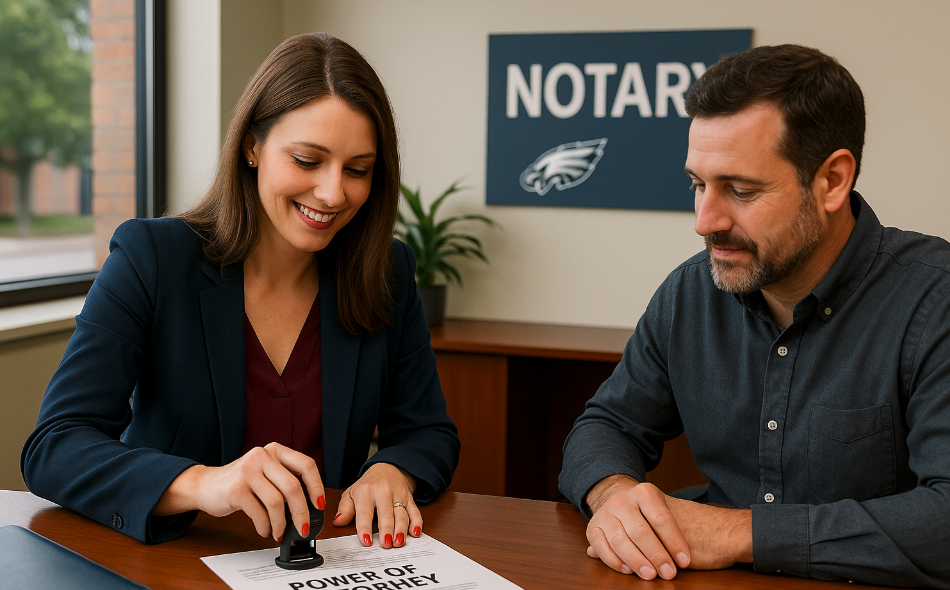Notarizing a will may seem straightforward, but the rules around it vary by state and by the type of will being signed. In Pennsylvania, notaries must understand when notarization is required, when it’s optional, and how to properly complete a self-proving affidavit if included. This tutorial explains what wills are, when notarization applies, and how to walk through the process confidently and legally.
Table of Contents
- What Is a Will?
- Types of Wills Commonly Notarized
- Step 1: Confirm the Notary’s Role
- Step 2: Review the Will Carefully
- Step 3: Identify the Signers
- Step 4: Check Witness Requirements
- Step 5: Complete the Notarization
- Step 6: Handle the Self-Proving Affidavit
- Final Thoughts
What Is a Will?
A will—formally known as a “Last Will and Testament”—is a legal document that outlines how a person (called the testator) wants their property distributed after death. It may also appoint guardians for minor children and designate an executor to carry out the instructions. In Pennsylvania, a will must meet certain requirements to be valid, including being in writing, signed by the testator, and witnessed by two competent individuals. While Pennsylvania does not require a will to be notarized to be legally valid, a notarized “self-proving affidavit” attached to the will can streamline the probate process by allowing the will to be admitted without requiring witnesses to appear in court.
Types of Wills Commonly Notarized
Notaries in Pennsylvania most frequently encounter formal wills that include a self-proving affidavit. You may also encounter handwritten (holographic) wills or statutory template wills. However, holographic wills are not legally recognized in PA unless they meet the same standards as a formal will. For the purpose of notarization, your focus will be on the affidavit—not the will itself.
Step 1: Confirm the Notary’s Role
In Pennsylvania, notaries do not notarize the will document itself. Instead, they notarize the self-proving affidavit that is signed by the testator and both witnesses. Your job is to complete this affidavit, which affirms under oath that the testator signed the will voluntarily and in the presence of witnesses. Before beginning, clarify with the signer or attorney that you are notarizing the affidavit—not the will.
Step 2: Review the Will Carefully
Review the will and the affidavit section to ensure everything is complete. Look for the testator’s name, the names of the two witnesses, and signature lines for all three. Confirm that the self-proving affidavit includes language indicating that the testator is of sound mind and signing the will freely. Ensure that the affidavit contains the notarial certificate—usually a jurat, since it involves sworn statements.
Step 3: Identify the Signers
You will need to verify the identities of all three signers: the testator and the two witnesses. Ask for current, government-issued photo ID from each person. Confirm that the names on their IDs match the affidavit. Make sure the testator appears alert, coherent, and is signing willingly. If there is any concern about mental capacity, stop the notarization and recommend that the client consult an attorney before proceeding.
Step 4: Check Witness Requirements
Pennsylvania requires at least two witnesses to observe the testator signing the will. For a self-proving affidavit, those same two witnesses will also sign the affidavit in front of you. Make sure they are not named as beneficiaries in the will. Some estate attorneys may also request a third person to witness the signing, depending on the complexity of the will or firm policy.
Step 5: Complete the Notarization
Once the testator and both witnesses are present and ready, have them sign the affidavit in your presence. Complete the jurat certificate by entering the venue (county and state), date, and your full notary name and title. Sign and affix your official notary stamp. Enter the notarization in your notary journal and include the names of the three signers, the document title (Self-Proving Affidavit for Will), the ID used, and any relevant notes. Even though a notary journal is not mandatory in Pennsylvania, it’s strongly recommended for legal protection in sensitive transactions like this.
Step 6: Handle the Self-Proving Affidavit
Return the completed, notarized affidavit to the signer or attorney. You may be asked to prepare certified copies or provide an acknowledgment page if the affidavit is going to be filed with the will later. Remind the signer to store the will and affidavit in a safe place and share a copy with their attorney, executor, or family. You do not keep a copy of the will or affidavit unless requested and permitted by law.
Final Thoughts
When you notarize a will’s self-proving affidavit, you’re doing more than stamping paper—you’re helping ensure a person’s final wishes are legally respected. These appointments often involve sensitive family dynamics, so staying professional, composed, and thorough matters. Always follow the law, document everything, and don’t be afraid to say no if something doesn’t feel right. If you want more hands-on guidance on notarizing estate documents, enroll in our PA Notary Training Course today and build the confidence and skills to serve high-value clients with ease.
🎓 Enroll in the PA Notary Course – Master Estate Signings and More
📥 FREE DOWNLOAD: PA Notary Appointment Guide
Want a printable guide to stay compliant? Download our free PA Notary Appointment Guide and keep your process sharp and stress-free.


